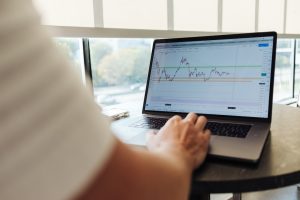DAX 30 or Deutscher Aktienindex 30 is the benchmark stock market index of the Frankfurt Stock Exchange (FSE). It is composed of 30 blue-chip companies listed on the exchange, which represent around 70% of the total market capitalization of German listed companies.
DAX 30 was created in 1988 with a base value of 1,000 points, and it is calculated in real-time during trading hours. The index is reviewed quarterly, and companies can be added or removed based on their market capitalization, trading volume, and other criteria.
DAX 30 is considered one of the most important stock market indices globally, and it is often used as a barometer of the German economy’s health. The index reflects the performance of the German stock market, which is dominated by the automotive, financial, and industrial sectors.
DAX 30 in Forex
Forex traders use DAX 30 as a benchmark to measure the performance of the German economy and the Eurozone as a whole. The index is often used as an indicator of risk sentiment, with traders viewing a rising DAX 30 as a sign of bullish sentiment and a falling index as a sign of bearish sentiment.
DAX 30 is also used as a tool to trade the Euro, as it is a proxy for the Eurozone’s economic strength. The Euro is the second most traded currency in the forex market, and any developments in the Eurozone economy can have a significant impact on the currency’s value.
Trading DAX 30 in Forex
Forex traders can trade DAX 30 using CFDs (contracts for difference), which allow them to speculate on the index’s price movements without actually owning the underlying assets. CFD trading allows traders to go long or short on the index, depending on their market expectations.
DAX 30 CFDs are traded on leverage, which means that traders can open positions with a small amount of capital, but the potential gains or losses are magnified. Traders should be aware of the risks involved in leveraged trading and use risk management strategies such as stop-loss orders to limit their losses.
Factors that affect DAX 30 prices
Several factors can affect DAX 30 prices, including:
1. Global economic trends: DAX 30 is highly sensitive to global economic trends, especially those that impact the Eurozone. Economic indicators such as GDP growth, unemployment rates, and inflation can have a significant impact on the index.
2. Company earnings: The performance of the 30 companies listed on DAX 30 can impact the index’s price movements. Positive earnings reports from blue-chip companies can lead to a rise in the index, while negative reports can lead to a decline.
3. Political events: Political events such as elections, policy changes, and geopolitical tensions can impact DAX 30 prices. Any developments that impact the German economy’s stability or the Eurozone’s economic prospects can have a significant impact on the index.
Conclusion
DAX 30 is an essential stock market index that reflects the performance of the German economy and the Eurozone as a whole. Forex traders use DAX 30 as a benchmark to measure risk sentiment and trade the Euro. Trading DAX 30 CFDs can be a lucrative opportunity for traders, but it comes with risks, and traders should use risk management strategies to protect their capital.






